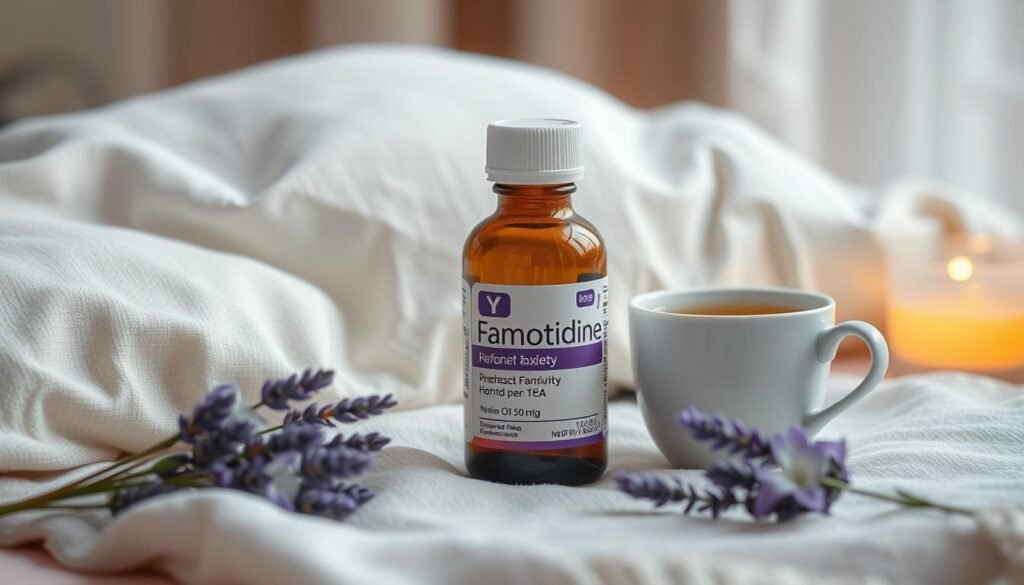Did you know that over one-third of individuals with COVID-19 face post-viral complications? This includes symptoms related to anxiety. This fact highlights the urgent need for effective treatments. Researchers are looking into famotidine, known for treating stomach issues, as a potential anxiety reliever. This piece explores famotidine’s role in anxiety relief, its actions, safety, and effectiveness. For more on famotidine types, dosages, and imprints, check WebMD.
Our understanding is growing, and with it, the interest in famotidine’s new uses. By digging into recent studies, you’ll learn how this widely used drug could fight off mental health problems. These issues have not been fully addressed in past treatments.
Key Takeaways
- Famotidine is primarily known for treating gastric issues but may also help with anxiety symptoms.
- Recent research shows significant improvements in anxiety scores among patients treated with famotidine.
- All tablets of famotidine are film-coated and come in different strengths, including 20 mg and 40 mg.
- Studies indicated no significant differences in adverse effects compared to placebo.
- Continuous evaluation of famotidine’s role in mental health is necessary as more data emerges.
Introduction to Famotidine
Famotidine is part of the histamine H2 antagonists family. It’s known for its effectiveness in treating gastrointestinal disorders. As a selective histamine H2 receptor antagonist, it focuses on conditions like gastroesophageal reflux disease (GERD) and peptic ulcers.
By targeting H2 receptors, famotidine cuts down stomach acid production. This helps people find relief from heartburn and similar issues.
Famotidine’s uses have grown beyond its initial purposes. Recent studies are looking at its off-label uses. They’re investigating famotidine for treating neuropsychiatric symptoms, like anxiety, especially after COVID-19.
This change highlights the importance of understanding famotidine’s broader therapeutic uses.
Famotidine, including versions like Pepcid AC, is available over-the-counter. This variety means people can pick what works best for them. As it becomes a go-to for more than just stomach problems, famotidine’s role in medicine grows.
Understanding Anxiety Symptoms
Anxiety shows up in different ways, affecting how we act every day. People with anxiety often feel very worried or scared. Here are some symptoms they might have:
- Restlessness
- Fatigue
- Difficulty concentrating
- Physical signs such as rapid heartbeat
There are various types of anxiety disorders, like generalized anxiety disorder (GAD), panic disorder, and social anxiety disorder. Each one brings its own set of problems. But they all involve the feeling of anxiety. Knowing about these symptoms is key to getting better.
Anxiety doesn’t just upset us. It can also cause physical problems, making things worse. It’s really important to recognize these signs and get help. Doctors can offer treatments that really work, such as medications.
Dealing with anxiety disorders early helps improve mental health. Having support from professionals and loved ones is vital. It lessens anxiety’s negative effects on our lives.
How Famotidine Works in the Body
Famotidine is known as an H2 blocker. It works by reducing the amount of stomach acid. This helps treat conditions like erosive esophagitis, GERD, and Zollinger-Ellison syndrome. With less stomach acid, problems like heartburn and difficulty swallowing get better.
Famotidine might also help with mental health. Studies are looking into its effects on mood and behavior. It might work by calming down inflammation in the brain. This could help people dealing with anxiety after an infection.
You can buy famotidine without a prescription for heartburn and indigestion. It starts working in about an hour and keeps working for up to twelve hours. Users should know it can cause headaches, constipation, and diarrhea. But, severe side effects are rare.
Doctors warn older adults to use famotidine with care because of possible side effects, like mood changes. Before taking it, patients should tell their doctors about any allergies to H2 blockers. Pregnant individuals need to talk about the risks with their doctors before using it.
| Feature | Details |
|---|---|
| Classification | H2 blocker |
| Available Forms | Prescription and OTC |
| Primary Use | Reducing stomach acid |
| Common Side Effects | Headaches, constipation, diarrhea |
| Working Time | 1 hour |
| Duration of Effect | 12 hours |
| Recommended Age for Use | 12 years and older |
Famotidine’s benefits go beyond the stomach problems—it might also help with mental health. More research could show its full potential in treating anxiety.
Famotidine Anxiety: New Research Findings
New studies on famotidine show it might help ease anxiety symptoms. This is especially true for people feeling anxious due to COVID-19. In a study with 50 patients, those who took 40 mg of famotidine twice daily for 12 weeks felt better. They showed improvements in thinking and feeling well emotionally.
Recent Studies on Famotidine and Anxiety Relief
Researchers used various tools to measure the study’s impact, including the Hamilton Anxiety Rating Scale. They noted a drop in anxiety levels for patients taking famotidine. By week 6, anxiety was less (p = 0.04). By week 12, it improved even more (p = 0.02). Tests also showed better cognitive function. This supports a study on how COVID-19 might affect the. It suggests famotidine could help with the brain issues COVID-19 survivors face.
Mechanism of Action against Neuropsychiatric Symptoms
Famotidine may reduce anxiety by targeting brain inflammation. It blocks certain receptors that cause inflammation, which is connected to anxiety and depression. This blockage also stops harmful chemicals from releasing, possibly boosting the immune response. So, it helps people recovering from viruses feel better mentally. This shows the good effects famotidine could have.

| Study Parameter | Famotidine Group | Placebo Group |
|---|---|---|
| Patients | 50 | 50 |
| Dose | 40 mg twice daily | Placebo |
| Duration | 12 weeks | 12 weeks |
| HAM-A Reduction (Week 12) | p = 0.02 | n/a |
| MoCA Score Improvement | 5.76 points | 2.92 points |
| MMSE Score Improvement | 4.96 points | 2.68 points |
| Adverse Effects | No significant difference | No significant difference |
Safety and Efficacy of Famotidine for Anxiety
Research shows that famotidine is generally safe for users, with few negative effects. Studies highlight its potential in easing anxiety symptoms without many side effects. Patients in these studies had minimal side effects, similar to those taking a placebo. This confirms its safety.
Famotidine is getting noticed for treating anxiety in clinical areas. Trials have shown that anxiety levels drop significantly after starting famotidine. This suggests it’s not only safe but also effective for people with anxiety.
Clinical trials offer deep insights into famotidine’s safety and effectiveness. As doctors look more into the data, famotidine appears promising. It could improve anxiety treatment while being safe to use.
Famotidine Dosage for Anxiety Symptoms
Knowing the right famotidine dosage for anxiety is key for good anxiety control. Studies often suggest starting with 20 mg to 40 mg twice a day. Yet, everyone’s needs can differ a lot. Things like health and certain symptoms matter a lot in finding the right dose.
Doctors usually have dosing guidelines they follow to tailor treatment. They might start someone on a low dose and adjust it depending on how they respond. Keeping track of changes and talking to your doctor for therapy changes is very important.
When thinking about using famotidine for anxiety, knowing about the available forms is crucial. These include 20 mg and 40 mg oral tablets. Having the right treatment plan is very important. Taking a personalized approach with your doctor can help manage anxiety better.

People looking into other options like gabapentin have resources available. One is this treatment guide. It talks about different doses and how well they work over time. Knowing the right dosages for various conditions can help people make better health choices.
Additional Benefits of Famotidine on Mental Health
Famotidine shows more than just anxiety relief; it has impressive mental health benefits. Studies show it could improve cognitive function and help with depression symptoms. This is especially true for people recovering from COVID-19.
In a study, 50 COVID-19 patients with cognitive issues were treated with 40 mg of famotidine twice daily for 12 weeks. This treatment led to better scores in cognitive tests.
The study saw clear improvements in the Mini-Mental State Examination (MMSE) scores at weeks 6 and 12 for those on famotidine. This indicates famotidine’s potential in reducing neuroinflammation. This reduction is key for emotional balance and brain function.
| Assessment Tool | Week 6 Improvements (p-value) | Week 12 Improvements (p-value) |
|---|---|---|
| MMSE | 0.014 | |
| MoCA | 0.001 | |
| HAM-D | 0.009 | 0.02 |
| HAM-A | 0.04 | 0.02 |
After COVID-19, many people deal with tiredness and trouble thinking. The research on famotidine shows it could really help with these issues. More studies could lead to using famotidine in different ways for mental health.
Famotidine Reviews for Anxiety Treatment
Famotidine has gotten mixed feedback from those using it for anxiety. It has an average score of 3.4 out of 5. This score shows people have had both good and bad experiences. Those who found it helpful say it improved their mood and reduced anxiety. They feel that famotidine is a valuable part of their treatment plan.
The feedback from users shows a range of effectiveness:
| Rating | Number of Reviews |
|---|---|
| 5 stars | 19 |
| 4 stars | 18 |
| 3 stars | 11 |
| 2 stars | 6 |
| 1 star | 11 |
However, not all feedback is positive. Some people have had negative experiences. They report more anxiety, trouble sleeping, and other serious side effects like mood swings and dizziness. Cases of increased anxiety were especially noted in those with conditions like systemic mastocytosis. This adds to the complex view of famotidine as an anxiety treatment.
A lot of users find famotidine easy to use, giving it a high ease-of-use rating. It helps with heartburn and reflux issues, as well as reducing anxiety for some. These dual benefits make famotidine appealing to a certain group of patients. The reviews offer valuable insights into its effects.

In conclusion, famotidine is an interesting option for those dealing with both anxiety and stomach issues. The mix of positive and negative reviews highlights the importance of understanding personal experiences. This can help people decide if famotidine is right for them.
Potential Side Effects and Considerations
Famotidine is usually safe, but it’s important to watch for side effects. Common ones include headache, dizziness, constipation, and diarrhea. These are often short-lived and might go away on their own.
Allergic reactions are rare but need quick action. Look out for hives, rash, and trouble breathing. Serious side effects like irregular heartbeat and confusion are less common but need urgent care.
Older adults may be more at risk due to their bodies’ changes. Factors that affect side effects include age, health, medications, and existing conditions.
- Age
- Overall health
- Current medications
- Pre-existing health conditions
People with kidney problems or vitamin B12 deficiency should talk to doctors. This helps adjust doses and monitor for negative effects.
Be careful when driving or using machines after taking famotidine. Overdoses can lead to severe dizziness and confusion. Call a poison helpline right away if this happens.
| Side Effect | Severity | Action Required |
|---|---|---|
| Headache | Mild | Monitor |
| Dizziness | Mild | Monitor |
| Diarrhea | Mild | Monitor |
| Constipation | Mild | Monitor |
| Allergic Reaction (hives, rash) | Severe | Seek medical help |
| Irregular Heartbeat | Severe | Seek medical help |
| Chest Pain | Severe | Seek medical help |
Conclusion
Famotidine offers a new way to help people recover from post-COVID-19 anxiety. The latest study with 50 people showed it improves mind function and reduces sadness and worry. Patients took 40 mg of famotidine twice daily for 12 weeks. This led to big improvements in how they felt, proving its value during tough times.
This summary tells us we should keep looking into how famotidine works for anxiety. The findings are very encouraging. They hint at more benefits like less swelling and stronger immune systems. Research shows famotidine is safe and effective. It gives us hope where other treatments might not work.
The goal is to learn more about famotidine for anxiety treatment. Such studies might change how we treat mental health issues. More research can help us use it more and possibly as a main treatment. For more details, check out the full study on famotidine anxiety treatment.